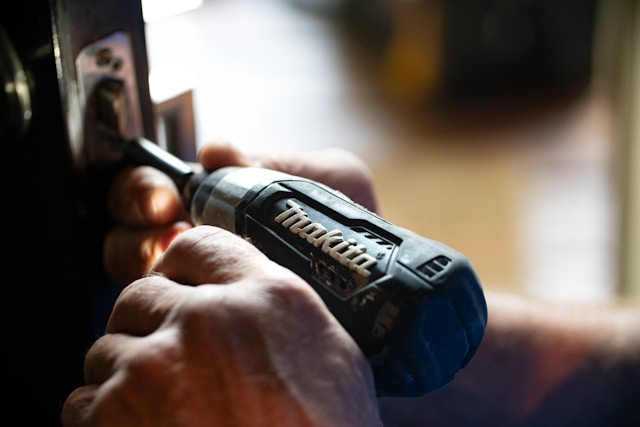Home maintenance can often seem like an overwhelming challenge in today’s fast-paced and busy world. From small repairs to major renovations, the list of tasks requiring attention can expand rapidly. This is where handymen become invaluable. These skilled experts offer a wide range of services that alleviate the stress of home upkeep and deliver considerable value to homeowners, without the hefty costs of hiring professionals.

What Does a Handyman Do?
A handyman is a skilled tradesperson who undertakes small projects in homes or businesses. It would be fair to say that a handyman could be classified as your go-to expert for home repairs and general maintenance tasks. In South Africa, a handyman serves as a multi-skilled expert, adept at handling a variety of maintenance, repair, and installation tasks in both residential and commercial settings. Whether you live in a suburban home, manage a sectional title complex, or operate a small business, a handyman is often your first point of contact for everyday issues that don’t necessitate a professional contractor or team.
Handymen are skilled in many common niggly – or even more complex – tasks which plague our everyday lives. Whether fixing a dripping tap, mending a broken door frame or installing curtain rails, amongst many other tasks, handymen provide affordable and efficient solutions to ensure your property remains safe, functional, and visually appealing.
Common Handyman Services in South Africa
A handyman in South Africa can generally handle a wide range of everyday tasks. This is an ideal solution for home or office owners needing cost-effective, practical help without having to hire multiple tradespeople.
Typical services they provide include:
Maintenance and Repairs
- Plumbing: Fixing leaking taps, toilets, clearing blocked drains, and sealing leaking pipes, especially important in regions affected by water restrictions.
- Electrical Work: Handling minor tasks such as replacing plugs, light bulbs, and switches, or repairing faulty wall sockets relating to non-COC tasks (Certificate of Conformity/Compliance) that don’t require a licensed electrician). For the record, a COC is a document or certificate that confirms a product, service, or system meets specific regulations, standards, or requirements. An Electrical COC is a certificate verifying that electrical installations in a property are safe and compliant with regulations. A skilled tradesperson can attend to minor electrical work which does not require full COC certification.
- Carpentry: Installing shelves, repairing cupboard doors, or building basic custom fittings such as cupboards or wardrobes.
- Painting: Performing touch-ups or full interior and exterior repaints to refresh and protect surfaces. This can include removing existing paint or varnish, sanding the area and repainting or revarnishing.
- General Property Maintenance: Cleaning gutters, fixing paving, repairing garden gates, and maintaining perimeter walls and fences.
Home and Office Improvements
- Minor Repairs: Patching plaster, filling cracks, and adjusting misaligned doors and windows.
- Installations: Mounting curtain rails, blinds, TV brackets, and installing security gates and light fixtures.
- Appliance and Equipment Repairs: Servicing garden tools, outdoor lighting, small household appliances, and addressing minor issues with garage doors and gates.
Other Useful Services
- Offering Client Advice: Offering guidance on maintenance schedules, appropriate materials, and preventive steps, all of which are especially helpful for sectional title owners, landlords, and holiday home managers.
- Performing Safety Checks: Identifying and attending to potential hazards such as loose tiles, unstable/unsafe fittings, or worn electrical plugs, all of which are crucial safeguards for homes with children, elderly residents, or tenants.
- Assisting Specialists: Supporting qualified electricians, plumbers, and builders with basic prep or post-work tasks, helping reduce labour time and overall project costs.
Handymen are invaluable assets for:
- Landlords who need a swift turnaround on rental units, especially during seasonal occupancy periods for holiday homes, or shorter lease periods.
- Body corporates requiring continuous maintenance in sectional title complexes.
- Busy homeowners who lack the time, tools, skills or knowledge to tackle routine tasks themselves.
What Are the Differences Between a Handyman and a General Contractor?
A handyman is a great option for smaller jobs, such as minor repairs and improvements to a residence or commercial building.
A general contractor usually works on larger projects, such as renovating buildings, new constructions or additions. These projects are generally more expensive and time-consuming jobs and require a team of professionals to complete the work.
Why Hire a Handyman Instead of a General Contractor?
When it comes to everyday home maintenance and smaller improvement projects, a handyman is often the smarter and more affordable option when compared to hiring a general contractor. While contractors typically manage large-scale renovations or construction, handymen are ideal for quick, cost-effective jobs around the house.
Homeowners often prefer handymen for routine work because:
- They Are Budget-Friendly: Handymen generally charge lower rates than building contractors, making them ideal for smaller jobs, especially in today’s tough economic climate.
- They Provide Cost-Effective Solutions: Hiring a handyman can be more economical than hiring specialists for each repair. Often, you can bundle several jobs together, which not only saves you time but also reduces overall costs.
- They Offer Flexible Scheduling: They’re often available sooner and can accommodate urgent or last-minute requests, which is perfect for fixing problems before visitors arrive or resolving issues between tenants.
- They Provide Personalised Service: A handyman often works directly with homeowners and builds long-term relationships, providing consistent, tailored service over time.
- They Offer Quick Turnaround on Small Tasks: From fixing a broken door to installing curtain rails, handymen can complete jobs quickly without the red tape and delays associated with larger projects.
- They Are Versatile: Most handymen in South Africa offer a wide range of services, from plumbing and electrical repairs (non-certified work) to painting, tiling, and minor carpentry.
- They Are Available for Emergency Repairs: Handymen are often available for urgent repairs – for instance, a burst pipe, broken gate, or faulty light – thus helping you manage unexpected household issues that arise after hours or on weekends when other contractors may not be available.
- They Are Familiar with Local Property Types: Whether it’s a freestanding home, a townhouse in a complex, or a coastal property prone to weather damage, a local handyman understands the specific challenges South African homes face.
Why South Africans Trust Handymen
A handyman offers a practical, efficient, and budget-friendly solution for smaller tasks in an environment where hiring specialised professionals can be eye-wateringly expensive and time constraints are a constant factor. Whether you’re managing a freestanding home in Johannesburg, a flat in Cape Town, or a coastal property along the Garden Route, a reliable handyman is an invaluable asset for ongoing property maintenance. By tackling minor issues early, they help prevent costly repairs in the future and ensure your home or office remains in excellent condition. Ultimately, having a skilled handyman on call can save you time, money, and ongoing stress.
When to Call a Handyman
Knowing when to call in a handyman can significantly increase the efficiency and cost-effectiveness of your home maintenance.
Hiring a handyman can be beneficial in:
- Routine Maintenance: Proactively address wear and tear by scheduling regular maintenance for tasks such as cleaning gutters, resealing windows, replacing worn-out tap washers, or servicing appliances.
- Smaller Home Projects: For quick and straightforward tasks like hanging picture frames, mounting shelves, replacing light fixtures, or assembling flat-pack furniture, a handyman provides fast and convenient solutions.
- Minor Home Improvements: If you’re working on a small renovation or upgrade, such as laying new flooring, repairing drywall, or repainting a room, a handyman can assist with multiple facets of the project, often at a lower cost than hiring individual specialists.
Final Word
Trustworthy handymen in South Africa are not just skilled experts who handle repairs and routine tasks. They offer a practical solution for everyday challenges. By tackling the “little things” before they escalate into major, costly problems, they can help protect your investment and provide you with valuable peace of mind.

